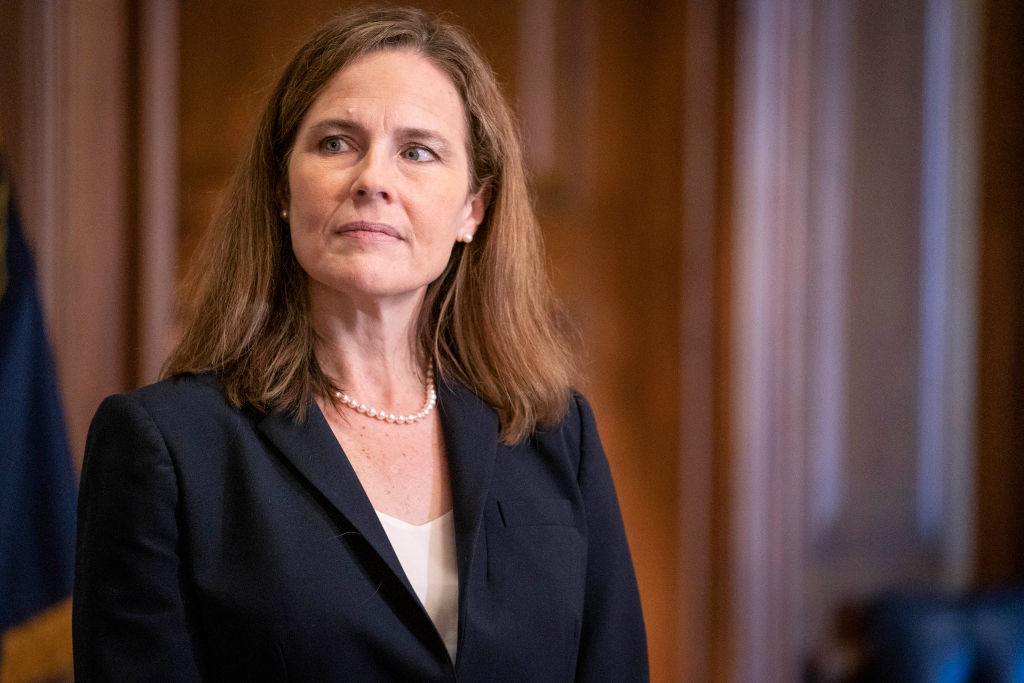The Everett M. Dirksen Federal Building, at 219 S. Dearborn St., contains the courtroom for the United States Circuit Court of Appeals for the Seventh Circuit, which covers the states of Illinois, Wisconsin, and Indiana. For the past three years, Judge Amy Coney Barrett has commuted there from her home in South Bend, Ind., where she teaches law at the University of Notre Dame.
Barrett, who is expected to be confirmed to the Supreme Court next week, will technically be trading a job in Chicago for one in Washington — “going coastal,” as we say. But she’s not going to be representing Chicago in the capital. In fact, Barrett’s jurisprudence will probably attempt to undermine the values of Chicago and much of Illinois.
In preparation for a justice like Barrett, our state legislature has been passing laws protecting abortion and gay rights, so the consequences of her decisions will affect us less than they do other states. As we learned when the Court overturned our handgun ban, not all local laws are immune to judicial activism.
Despite her business address, Barrett is in no sense a Chicagoan. She grew up in Louisiana, went to college in Tennessee, and now lives in Indiana. Her first involvement in politics was as a member of the Republican legal team who fought the 2000 Florida recount, pitting her against Al Gore’s campaign manager, Bill Daley.
Like the late Justice Antonin Scalia, for whom she clerked, Barrett is an originalist, believing the Constitution is an unchanging document whose body and amendments should be interpreted exactly as the politicians of those era intended them. Scalia was baffled by Roe v. Wade, which found a right to abortion in the 14th Amendment.
“It’s plain absolutely plain, that the right to an abortion was not thought to exist in 1791 or at the time that the post-Civil War amendments were adopted, since there were laws against abortions in all the states,” Scalia once said. “It’s absolutely plain that there was no right to die, since there were laws against suicide. And you can go right down the list.”
(Barrett is also opposed to a constitutional right to abortion. In 2006, she signed her name to an ad placed in the South Bend Tribune by St. Joseph County Right to Life, which declared, “It’s time to put an end to the barbaric legacy of Roe v. Wade and restore law that protects the lives of unborn children.”)
Barack Obama, who was a lecturer at the University of Chicago Law School, took a different view of the Constitution, both in his teaching and his judicial appointments. Obama believed in a “Living Constitution,” which can be reinterpreted to adapt to changing social and political mores. (Brown v. Board of Education, which in 1954 struck down earlier decisions favoring school segregation, is a classic example of living constitutionalism.)
Chicago has been on the losing end of that debate between judicial philosophies, and likely will be again, once the Court has a 6-3 conservative majority. In the 2010 case McDonald v. Chicago, the Supreme Court struck down the city’s handgun ban, finding that it violated the 2nd Amendment’s guarantee of a right to bear arms. Northwestern University Law Professor Steven Calabresi called the decision “a major victory for originalists.” One of the dissenters was Justice John Paul Stevens, who signed on to an opinion holding that gun violence in cities was a permissible reason to ban handguns.
Stevens, who was appointed by Republican President Gerald Ford but eventually joined the liberal bloc of justices, was Chicago’s man on the Supreme Court. A native of the city whose family built the Stevens Hotel (now the Hilton Chicago), Stevens attended the University of Chicago and Northwestern Law School before building his own local law firm and then serving on the Seventh Circuit, like Barrett. The only current justice with Chicago ties is Elena Kagan, who taught at U of C Law from 1991 to 1995, at the same time as Obama. (Unfortunately, we missed out on a chance to have another local on the Court when the Senate refused to vote on Obama’s nomination of Niles West High School alumnus Merrick Garland, ahead of the 2016 election.)
If Barrett turns out to be the anti-Chicago justice she appears to be, Chicago is ready for her. Last year, the state legislature passed the Reproductive Freedom Act as a pre-emptive defense against a Court that might overturn Roe v. Wade. Since such a decision would return the decision on abortion to the states, the new law, sponsored by Rep. Kelly Cassidy, D-Chicago, establishes abortion as a fundamental right in Illinois, and allows late-term procedures if the fetus is not viable or the mother’s health is endangered. Illinois is also one of 11 states with a law on the books guaranteeing the right to same-sex marriage, so it will remain legal here even if the Court strikes down Obergefell v. Hodges, as Justices Clarence Thomas and Samuel Alito have been making noises about.
Still, Illinois would be subject to conservative rulings on such issues as labor law, health care, and voting rights. For a Court that truly reflects deep-blue Chicago, it would take at least another justice or two to look after those values. Barack Obama gave Joe Biden a job. Maybe Biden can return the favor and put Obama on the Supreme Court.




Comments are closed.